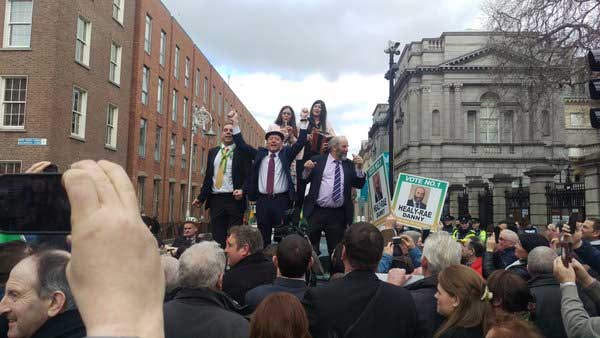A Century of Politics in the Kingdom: A County Kerry Compendium
by Owen O’Shea and Gordon Revington (Merrion Press, €19.95)
This is a comprehensive account of local politics and the democratic process in Co. Kerry across more than two centuries. It covers in fact the rise of modern democracy in Ireland, and its preservation, often against heavy odds. Both trends are remarkable.
The authors list distinguished figures who represented the town of Tralee at Westminster in the 19th Century. The list includes the Duke of Wellington, Prime minister George Canning, Luke Gardiner, who built most of the north side of Dublin, and Lord Norbury, ‘the hanging judge’ of the 1798 rebellion.
The Local Government Act of 1898 established the new county councils, including Kerry County Council, as well as Urban District Councils in Tralee, Killarney and Listowel. From 1899 onwards elections to the Kerry County Council were routinely held.
This routine, however, was interrupted in 1908. After a febrile campaign Denis J. Reidy, a defeated candidate, claimed that his opponent had won his seat by bribing voters, supplying them with drink and intimidating them. A court decided that both parties were guilty of corrupt practices and declared the election to be void.
Very few women were elected to the county council. Kit Aherne of Fianna Fáil became the first woman chairperson, serving in 1977-78. Mary O’Donoghue, also of Fianna Fáil, the second in 1982-83 and Toiréasa Ferris of Sinn Féin in 1999.
Republican
None, however, were as long-serving or as influential as the redoubtable Kate Breen. She won her seat in 1926 as a republican, was re-elected in the Fianna Fáil interest in 1928, and held her place until she died in 1937.
In the general election in December 1918 Piaras Béaslaí, Dr Jim Crowley, Fionán Lynch and Austin Stack were returned unopposed to East Kerry, North Kerry, South Kerry and West Kerry respectively.
At the inaugural meeting of Dáil Éireann in the Mansion House in Dublin on January 21, 1919 Piaras Béaslaí was the lone TD present from Kerry, as the others were incarcerated in England. He was given the honour of reading into the proceedings the Democratic Programme, which had been drafted by Thomas Johnson, leader of the Irish Labour Party.
The four Kerry TDs were active in the war of independence (1919-1921). Apart from Stack they supported the Anglo-Irish Treaty and the Irish Free State. Stack was a prominent opponent of the Treaty and the early administrations of the new Irish regime. He continued to campaign for Sinn Féin at home and abroad and ended his political career when unable to contest his seat in the general election in September 1927.
Political families – even dynasties – were a feature of Kerry politics. Fred Crowley was elected to Dáil Éireann for South Kerry in 1927. He subsequently married Honor Mary Boland. She was the daughter of John Pius Boland who represented the Irish Parliamentary Party in South Kerry until 1918. In the by-election following Fred Crowley’s death in 1945 his widow was returned to the seat and held it until she died in 1966.
(By the by, John Pius Boland, the father of Bridget Boland, the playwright who wrote The Prisoner (1955), was the very pro-active general secretary of the Catholic Truth Society in England, a man two generations of English Catholics owed a great deal to.)
Tommy McEllistrim, a leading figure in the war of independence in North Kerry, was elected to Dáil Éireann in 1923 and subsequently his son and later his grandson held the seat. Dan Spring, a trade-union official, represented Labour in Dáil Éireann as did his son, Dick (Tánaiste in three governments) and grandson Arthur.
In recent years the Healy-Raes have been the best-known political family in Kerry. Strongly represented on the county council and nationally, the secret of their remarkable success is simple. It is the efficient 7-24-365 service they provide to their constituents.
All those interested in local and national politics will treasure this meticulously researched and immensely informative account of politics in the ‘Kingdom’. Along with Tony White’s recent book, it records information not easily found elsewhere.


 The Healy-Rae clan on campaign trail
The Healy-Rae clan on campaign trail 